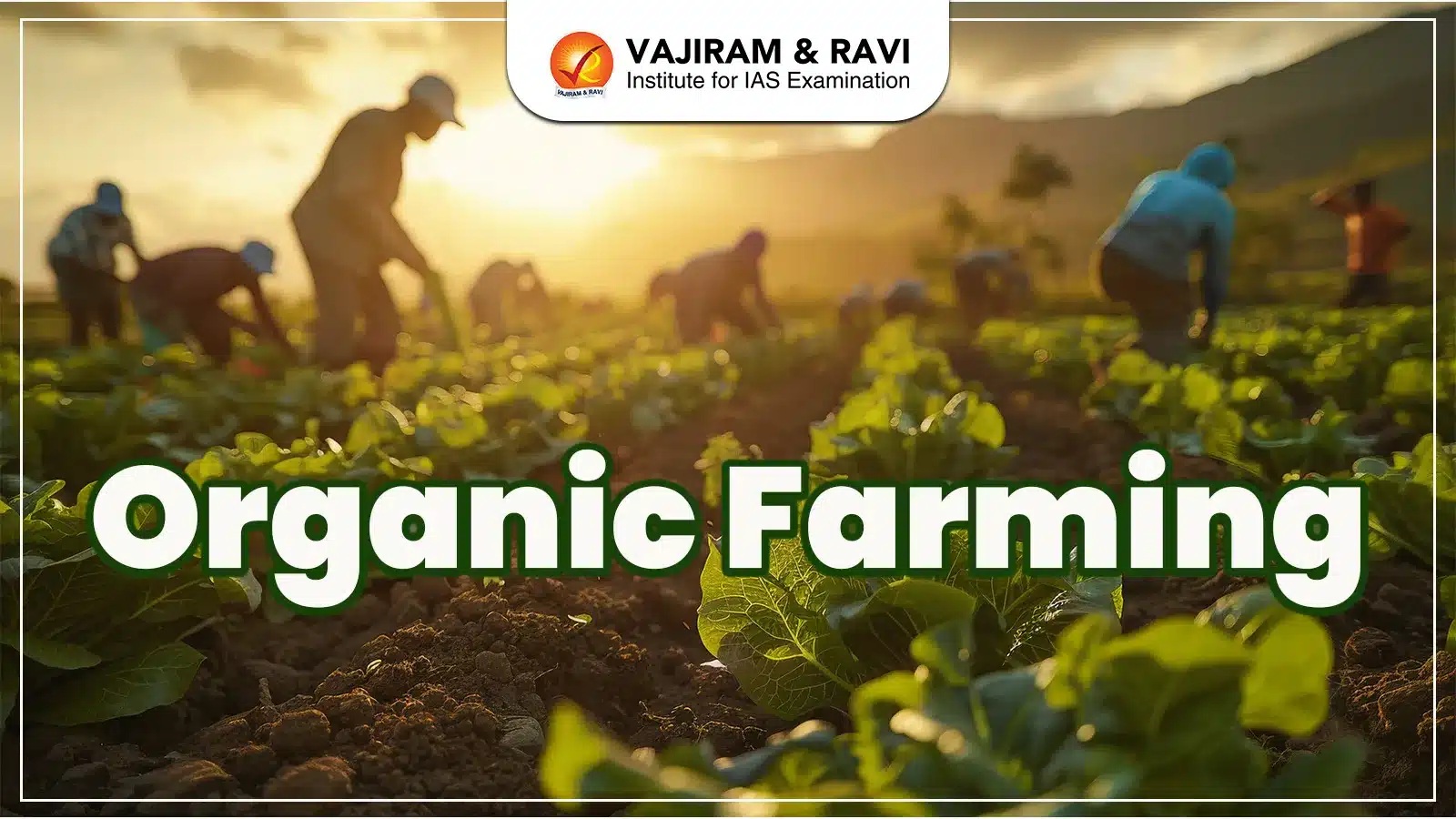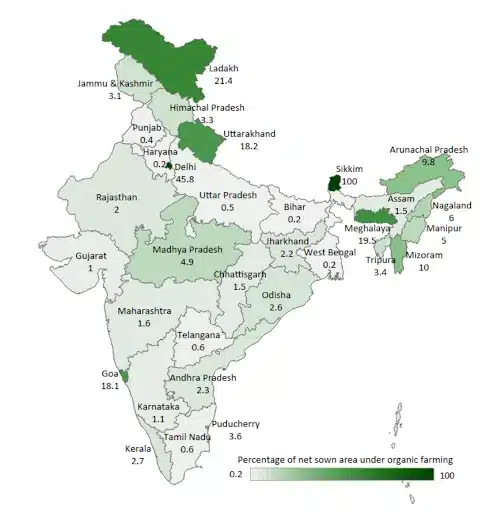Organic farming is a sustainable agricultural approach that avoids synthetic chemicals and relies on natural inputs. Its roots trace back to ancient civilisations and gained momentum in the 20th century. Organic farming is based on principles of health, ecology, fairness, and care, ensuring soil fertility, biodiversity conservation, and minimal environmental impact.
Organic farming has its advantages but also faces challenges such as higher costs, lower yields, and complex certification processes. Government initiatives like the NPOP provide support through financial aid and certification help. To make organic farming more sustainable and scalable, greater investment is needed in research, affordable certification, advanced technologies like AI and drones, and stronger supply chains.
What is Organic Farming?
Organic farming is an agricultural system that prioritises sustainability by avoiding or significantly reducing the use of synthetic inputs, such as chemical fertilisers, pesticides, hormones, and feed additives. Instead, it relies on natural methods like crop rotations, crop residues, animal manures, off-farm organic waste, mineral-grade rock additives, and biological systems for nutrient mobilisation and plant protection to the greatest extent possible.
History of Organic Farming
Organic farming dates back to ancient civilisations like Mesopotamia, the Indus Valley Civilisation and is mentioned in the Vedic literature. In the early 1900s, pioneers like Sir Albert Howard and Rudolf Steiner developed modern organic agriculture concepts, emphasising natural soil enrichment and crop rotation. Inspired by Indian farming, Howard promoted sustainable practices.
Rachel Carson’s Silent Spring (1962) raised awareness of industrial farming’s harm, boosting organic demand. Today, organic farming is practised globally, addressing climate change, soil degradation, and environmental sustainability.
Organic Farming Principles
Principles of Organic Agriculture emphasise sustainability and responsibility across four key areas that are Health, Ecology, Fairness and Care.
- Health: Organic agriculture prioritises the health of soil, plants, animals, humans, and the planet, avoiding practices and substances harmful to these interconnected systems.
- Ecology: It aligns with natural ecological systems and cycles, working to protect and sustain the environment, including biodiversity, climate, and water resources.
- Fairness: It fosters equitable relationships in production, distribution, and trade, ensuring justice and accountability for environmental and social impacts.
- Care: Organic farming takes a precautionary and responsible approach, considering the well-being of present and future generations through transparent and inclusive decision-making.
Organic Farming Methods
Organic farming encompasses various methods like crop rotation, polyculture, drip irrigation, organic pesticides, etc, for better soil, water, and crop management.
Soil Management
- Crop Rotation: Rotating crops to maintain soil fertility and control pests.
- Minimum Tillage: Reducing soil disturbance to preserve soil health
- Manures: Turning organic waste into nutrient-rich compost.
Crop Management
- Polycultures: Growing multiple crops together to promote biodiversity.
- Agroforestry: Integrating trees with crops to promote ecological balance.
- Integrated Pest Management: Using natural methods to control pests.
Water Management
- Drip irrigation: Efficiently delivering water directly to roots.
- Mulching: Conserving water through mulch application.
Pest and disease control
- Organic pesticides: Using natural pesticides like neem oil and pyrethrin.
- Biological control: Using beneficial insects to control pests. Eg. Lady Beetles against Whitefield.
Need for Organic Farming
Conventional farming has led to biodiversity loss, environmental degradation, health risks, and soil depletion, making organic farming a sustainable alternative:
- Environmental degradation: Conventional farming practices have led to soil erosion, water pollution, and loss of biodiversity.
- Health concerns: Pesticide and fertiliser residues in food have been linked to various health problems. According to the World Health Organization (WHO), Pesticide exposure increases cancer and neurological disease risks.
- Soil degradation: Intensive farming degrades soil fertility, with India losing approximately 5.3 billion tons of soil annually due to erosion (ICAR, 2015).
- Water pollution: The use of synthetic fertilisers and pesticides in conventional farming has contaminated water sources, posing a risk to the environment.
Benefits of Organic Farming
Organic farming offers numerous advantages that contribute to environmental sustainability, human health, and economic growth. By reducing dependency on synthetic inputs and promoting natural agricultural practices, it ensures a balanced and resilient farming system. The following benefits highlight the significance of organic farming in modern agriculture.
- Soil Conservation: Organic practices like crop rotation reduce soil erosion, helping maintain long-term soil fertility.
- Water Conservation: By using efficient irrigation and mulching, organic farming reduces water wastage.
- Biodiversity: Organic farms encourage natural pest control and diverse cropping, fostering healthier ecosystems.
- Lower Pesticide Exposure: Conventional farming relies on synthetic pesticides, increasing health risks.
- Higher Nutritional Value: Organic crops use natural fertilisers, enhancing their nutrient content.
- Higher Earnings: Organic produce commands premium prices, increasing farmers' income.
- Preserving Traditions: Organic farming integrates traditional agricultural knowledge, sustaining local practices.
Challenges of Organic Farming
Organic farming, while beneficial for the environment and health, faces several challenges. These include higher production costs, lower yields, difficulty in pest management, and limited market access. The following are the details of these challenges:
- Higher Production Costs: Organic farming often requires more labour and costly organic inputs.
- Lower Yields: Organic farming tends to produce lower yields per hectare when compared to conventional farming, particularly in the first 2-3 years.
- Pest and Weed Management: Managing pests without chemicals can be more difficult in organic farms.
- Certification and Regulation: Obtaining organic certification is costly and time-consuming. In India, organic certification can take up to 3 years, adding financial pressure on farmers.
- Market Access and Pricing: Organic products face limited market access and price competition.
- Climate Vulnerability: Organic farming can be more susceptible to climate impacts.
Organic Farming vs Conventional Farming vs Zero Budget Natural Farming (ZBNF)
Organic, conventional, and Zero Budget Natural Farming (ZBNF) are distinct farming systems that differ in aspects such as the use of chemicals, impact on soil health, and productivity. The key differences are as follows:
|
Factors |
Traditional Farming |
Organic Farming |
ZBNF |
|
Definition |
Uses chemical fertilisers and pesticides |
Uses organic manure and compost. |
Farming with zero external inputs, relying on natural resources and homemade bio-inputs like Jeevamrut, Beejamrut, etc. |
|
Soil Health |
Degrades soil health over time due to chemical use. |
Improves soil health with organic matter. |
Increases soil fertility using natural microbes and mulching. |
|
Water Requirement |
High water usage due to intensive cultivation. |
Moderate water requirement with organic mulching. |
Very low water usage due to mulching and natural irrigation. |
|
Productivity |
Initially high but decreases over time. |
Sustainable but slightly lower than traditional farming. |
Sustainable yield with minimal cost input. |
|
Dependence on Market and Cost of Cultivation |
High dependence on external inputs, hence high cost of production |
Moderate, as organic inputs can be bought. |
Almost zero, as farmers produce inputs themselves. |
|
Ecological Impact |
High environmental degradation. |
Environmentally friendly but needs external inputs. |
Fully sustainable, improves biodiversity and soil health. |
Organic Farming in India
Organic farming in India has been gaining momentum in recent years, driven by growing consumer demand for chemical-free produce and government initiatives to promote sustainable agriculture. The following are key statistics on the status of organic farming in India:
Status of Organic Farming in India
As per the Council on Energy, Environment, and Water, the following are the acreage, geographies, and cultivation details of Organic farming in India:
- Area under organic farming: As of 2020, India had 2.78 million hectares under certified organic farming, representing 2% of the total net sown area.
- Farmers practising organic farming: Over 1.9 million farmers were registered under two certification systems by 2020. India has the top spot in the world rankings for most organic producers.
- Prevalence across India: Organic farming is widespread, especially in Madhya Pradesh, Rajasthan, and Maharashtra. Sikkim is India's first 100% organic state.
- Major crops: Key organic crops include oilseeds, cotton, tea, and coffee, with India leading in organic cotton production.
- Export: India’s organic exports reached 1.3 million metric tons, valued at ₹3,500 crores (USD 470 million) in 2020.
- Global leadership in cotton: India produced 51% of the world’s organic cotton in 2018-19.
Figure. State-wise organic coverage (proportion to the net sown area of the state)
Government Measures for Organic Farming
The Union and state governments have implemented several schemes, such as the Organic Farming Policy, Paramparagat Krishi Vikas Yojana, and Soil Health Card, to promote organic farming at both national and state levels.
- National Programme for Organic Production (NPOP): Provides certification, and financial aid, and promotes research to enhance organic farming practices and market access.
- Paramparagat Krishi Vikas Yojana (PKVY): Launched in 2015, supports farmers with financial aid and encourages cluster-based organic farming for better resource sharing.
- Organic Farming Policy: Aim to expand organic agriculture, boost production and exports, and support small farmers with premium pricing benefits.
- Mission Organic Value Chain Development for North Eastern Region (MOVCDNER): Focuses on organic farming growth in the Northeast through certification, training, and market support.
- State-Level Initiatives: Programs like the Sikkim Organic Mission and Andhra Pradesh ZBNF promote organic farming with financial aid, certification assistance, and marketing support.
Organic Farming Way Forward
To ensure the widespread adoption of organic farming, a multi-faceted approach is required, focusing on research, policies, awareness, certification, and technological advancements. The following measures can help accelerate the growth of organic farming in India.
- Research and Development: Investment in capacity building and training for small-scale producers is essential. Emphasis should be on composting techniques, quality assurance, and marketing strategies to enhance organic manure production.
- Policies and Schemes: A well-structured national program should be developed, ensuring quality fertilisers through strict monitoring and enforcement mechanisms.
- Raising Awareness: Farmers should be trained through farmer-led schools, ICT tools, expert interactions, and best-practice sharing to encourage on-farm organic input production.
- Smoother Certification Process: The high cost of certification deters small farmers. Making certification accessible and affordable is crucial for wider adoption.
- Technological Advancement: Drones and AI can bridge productivity gaps, optimise soil fertility, and support sustainable organic farming practices.
- Supply Chain Management: Decentralized, local production of organic inputs should be promoted to utilise regional resources, create employment, and prevent adulteration.
Organic Farming UPSC PYQs
Question 1. What are the present challenges before crop diversification? How do emerging technologies provide an opportunity for crop diversification? (UPSC Mains 2021)
Question 2. How far is the Integrated Farming System (IFS) helpful in sustaining agricultural production? (UPSC Mains 2019)
Question 3. Sikkim is the first ‘Organic State in India. What are the ecological and economic benefits of an Organic State? (UPSC Mains 2018)
Last updated on January, 2026
→ Check out the latest UPSC Syllabus 2026 here.
→ Join Vajiram & Ravi’s Interview Guidance Programme for expert help to crack your final UPSC stage.
→ UPSC Mains Result 2025 is now out.
→ UPSC Notification 2026 Postponed for CSE & IFS which was scheduled to be released on 14 January 2026.
→ UPSC Calendar 2026 has been released.
→ UPSC Prelims 2026 will be conducted on 24th May, 2026 & UPSC Mains 2026 will be conducted on 21st August 2026.
→ The UPSC Selection Process is of 3 stages-Prelims, Mains and Interview.
→ Prepare effectively with Vajiram & Ravi’s UPSC Prelims Test Series 2026 featuring full-length mock tests, detailed solutions, and performance analysis.
→ Enroll in Vajiram & Ravi’s UPSC Mains Test Series 2026 for structured answer writing practice, expert evaluation, and exam-oriented feedback.
→ Join Vajiram & Ravi’s Best UPSC Mentorship Program for personalized guidance, strategy planning, and one-to-one support from experienced mentors.
→ UPSC Result 2024 is released with latest UPSC Marksheet 2024. Check Now!
→ UPSC Toppers List 2024 is released now. Shakti Dubey is UPSC AIR 1 2024 Topper.
→ Also check Best UPSC Coaching in India
Organic Farming FAQs
Q1. What is organic farming?+
Q2. What are the 5 benefits of organic farming?+
Q3. What is the biggest organic farming?+
Q4. What are the 4 principles of organic farming?+
Q5. Who is the father of organic farming? +



















